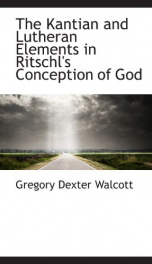the kantian and lutheran elements in ritschls conception of god

Purchase of this book includes free trial access to www.million-books.com where you can read more than a million books for free. This is an OCR edition with typos. Excerpt from book: CHAPTER II. Kant's Conception Of God. The atmosphere Kant breathed was different in many respects from that which surrounded Luther. The Renaissance movement, the influences of which Luther felt in part, had developed and merged itself into the period of modern thought. The lines that converged upon Luther's period were no less apparent in Kant's time, but with an advance. In addition to a larger knowledge of the history of the Church, and a completer understanding of Plato and of Aristotle and the interweaving of that material by the schoolmen, the period in which Kant lived had the newer thought of Descartes, Spinoza, Rousseau, Leibnitz and Wolff, together with the different but none the less important thought of Bacon, Hobbes, Locke, Berkeley, Hume and Newton. Still further, the Protestant movement which owed ite immediate inception to Luther and which naturally at that time was experiencing its birth-throes had permanently established itself. It had, too, passed through a period of scholasticism and experienced within its own circles a new reformation under the name of Pietism. There had also throughout Europe become quite pronounced a feeling for independent nationality in opposition to the Church imperialism of the Middle Ages. With all this Kant was not so familiar as are the best students of history and philosophy to-day, but these lines cross and recross within his works. He is differentiated from Luther, also, in that while Luther rejected the Copernican theory of the heavens,1 Kant fully accepted it and in his own work upon the " Geography of the Heavens " added to it by his outlined Nebular Hypothesis. Not without its significance is this different atmosphere and this different point of view in a consideration of Kant's conception of God. 1 Chapter I., p. 4. ... --This text refers to an alternate Paperback edition.
Info about the book
Author:
Series:
Unknown
ASIN:
B001M1Z7F4
Rating:
3/5 (3)Your rating:
0/5
Languge:
English
Users who have this book
Users who want this book
What readers are saying
What do you think? Write your own comment on this book!
write a commentif you like the kantian and lutheran elements in ritschls conception of god try:
Other books by this author
Do you want to read a book that interests you? It’s EASY!
Create an account and send a request for reading to other users on the Webpage of the book!


